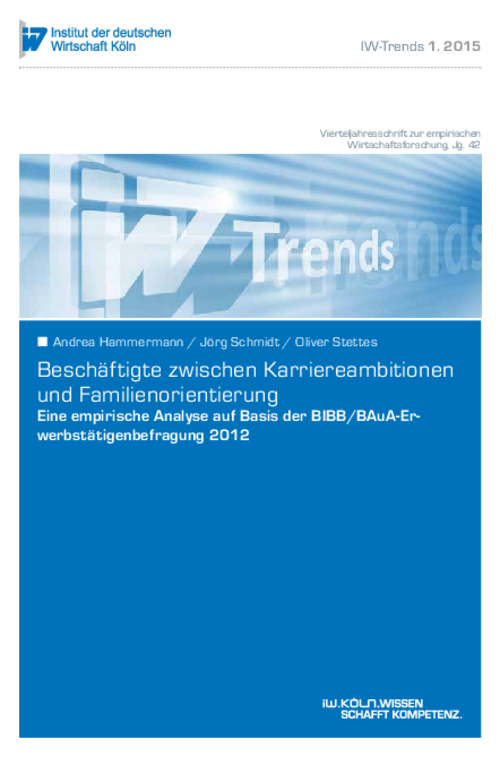An empirical analysis based on the 2012 BIBB/BAuA Employment Survey

German workers’ attitudes to the balance between career goals and family interests
IW-Trends

An empirical analysis based on the 2012 BIBB/BAuA Employment Survey
A strong time commitment continues to be one of the key conditions for achieving career goals in German business. One of the main conclusions of an empirical analysis based on the BIBB/BAuA Employment Survey, this may explain why only every second man and every third woman attaches high value to professional advancement. Particularly in the 31- to 40-year-old age group employees see themselves as facing a dilemma between striving to attain their career goals and finding time for the interests of their family. This applies equally to women and men. Those who give priority to their careers are more likely to hold a managerial position, with almost 37 per cent of career-oriented women and some 43 per cent of career-oriented men in this age group performing line management duties with responsibility for other staff. Among all 31- to 40-year-olds this is true for a mere 28 percent of women and 36 per cent of men. While it may be difficult to reconcile career goals with astrong time commitment to family interests, employees do not necessarily perceive this as a drawback. This is because for career-oriented, as opposed to family-oriented, employees, the main factor in

Andrea Hammermann / Jörg Schmidt / Oliver Stettes: Beschäftigte zwischen Karriereambitionen und Familienorientierung - Eine empirische Analyse auf Basis der BIBB/BAuA-Erwerbstätigenbefragung 2012
IW-Trends

More on the topic

What factors influence the career ambitions of people with disabilities?
Many companies in Germany report having difficulties not only in recruiting employees, but also in filling vacant management positions.
IW
Leadership in transformation: Megatrends and management as a driver of change
Leadership dynamics in companies are subject to constant change in order to meet the challenges of their time. Today, the greatest influences result from developments such as demographic change, globalization, individualization, structural change and ...
IW